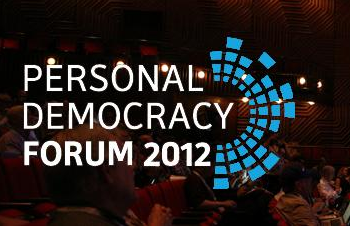NEW YORK — The famous Chinese artist and dissident Ai Weiwei once wrote in a blog, “To express yourself needs a reason, but expressing yourself is a reason.” In the highly censored world of Chinese media, this sums up the growing consensus within that country — and around the world — that the freedom of expression and dissent is important as an ends, and not just a means.
I’m writing from the 2012 Personal Democracy Forum (PDF12), taking place this week at New York University, and where a group of presenters tackled the issue of Internet Freedom in China.
With more than half of a billion people online, China’s Internet holds major promises and perils for Chinese citizens who hope to learn about the world — and help the world learn about them — using this medium.
A Medium for Cultural Understanding

Jessica Beinecke is the host of Voice of America’s viral online video show “OMG! Meiyu,” in which she discusses American slang and pop culture directly with young Chinese viewers … in fluent Mandarin, of course. Presenting at PDF12, Beinecke emphasized how these short, two-minute videos can be a crucial tool for cross-cultural exchange. Thousands of Chinese youth subscribe to her Weibo account (the Chinese version of Twitter). She insists that these kids are participants — not followers — since they ask her questions about American sayings that she addresses in future web videos. In this light, Beinecke and VOA aren’t simply pushing out American culture (a traditional public diplomacy tactic), but actually responding to the curiosity of her trans-Pacific audience — even if that curiosity ends up with explanations of the phrases “Haters Gonna Hate” or “Badonkadonk” as one of our cultural exports.
A cultural export that has failed to gain traction in China, even if it has emerged in other parts of the world, is political protest. In contrast to the Occupy Wall Street protests in the West or the Arab Spring movements occurring throughout the Middle East, overt expressions of collective dissent appear to be absent in China.

Michael Anti, a veteran journalist and an associate fellow at the Asia Society, suggests that the Chinese government has effectively silenced dissent through a three-phased strategy: It blocks all important web 2.0 services behind the Great Firewall (YouTube, Facebook, Twitter and Wikipedia are all blocked), creates copycat versions of each of these sites that can be monitored by Chinese censors, and ensures that all servers are kept in China so that the data can be controlled.
According to An Xiao Mina, a social media artist, in order to bypass censors, people protest by using subtle memes — visual or symbolic codes or language that censors find difficult to interpret. When the artist Ai Weiwei was imprisoned, many of his supporters used an image of sunflower seeds — a subject used in one of his popular modern art exhibitions — as a symbol of solidarity and dissent. An refers to a “law of meme-o-dynamics,” in which great censorship calls for more urgency for a meme language.
A Direct Approach

But many in the United States are not interested in responding to China’s well-documented censorship activities with artistic or creative workarounds. As the New York Times reported earlier this week, American human rights organizations (including Movements.org, started by State Department digital media veteran Jared Cohen) are increasing their support for online activists living under authoritarian regimes. I spoke to David Keyes, the executive director of Advancing Human Rights and co-founder of CyberDissidents.org, who was featured in the Times article and who addressed the issue of Chinese censorship specifically.
Keyes put the problem in stark terms when he said that the “Chinese government has demonstrated repeatedly that it fears freedom of speech and is willing to use draconian measures to stifle individual dissidents.” Yet he ended our conversation optimistically, noting that the “Chinese activists are among the most skillful in the world at circumventing censorship. They are clever and brave — a powerful combination. It is particularly important for the free world to unapologetically stand behind those Chinese online activists who pay such a heavy price for speaking their mind.”
The problem of Internet freedom — or lack thereof — in China is a complex one that has challenging political, cultural, and diplomatic dimensions. The key theme of this year’s Personal Democracy Forum was “The Internet’s New Political Power.” However, it was clear from the speaking program that, at least in China, the political power of the Internet has not been unleashed … yet.
Mark Hannah is the political correspondent for MediaShift. Mark’s political career began on the Kerry-Edwards presidential campaign, where he worked as a member of the national advance staff. He’s more recently done advance work for the Obama-Biden campaign, the Presidential Inaugural Committee and the White House. In the “off-season” (i.e., in between campaigns) he worked in the PR agency world and conducted sensitive public affairs campaigns for well-known multinational corporations, major industry organizations and influential non-profits. He serves on the board of directors of the National Association for Media Literacy Education, is a member of the Public Relations Society of America and was a research fellow at the Society for New Communications Research. He is a graduate of the Annenberg School for Communication at the University of Pennsylvania and received a master’s degree from Columbia University. His personal website is www.mark-hannah.com, and he can be reached at markphannah[at]gmail.com. Follow Mark on Twitter: @MarksTerritory

